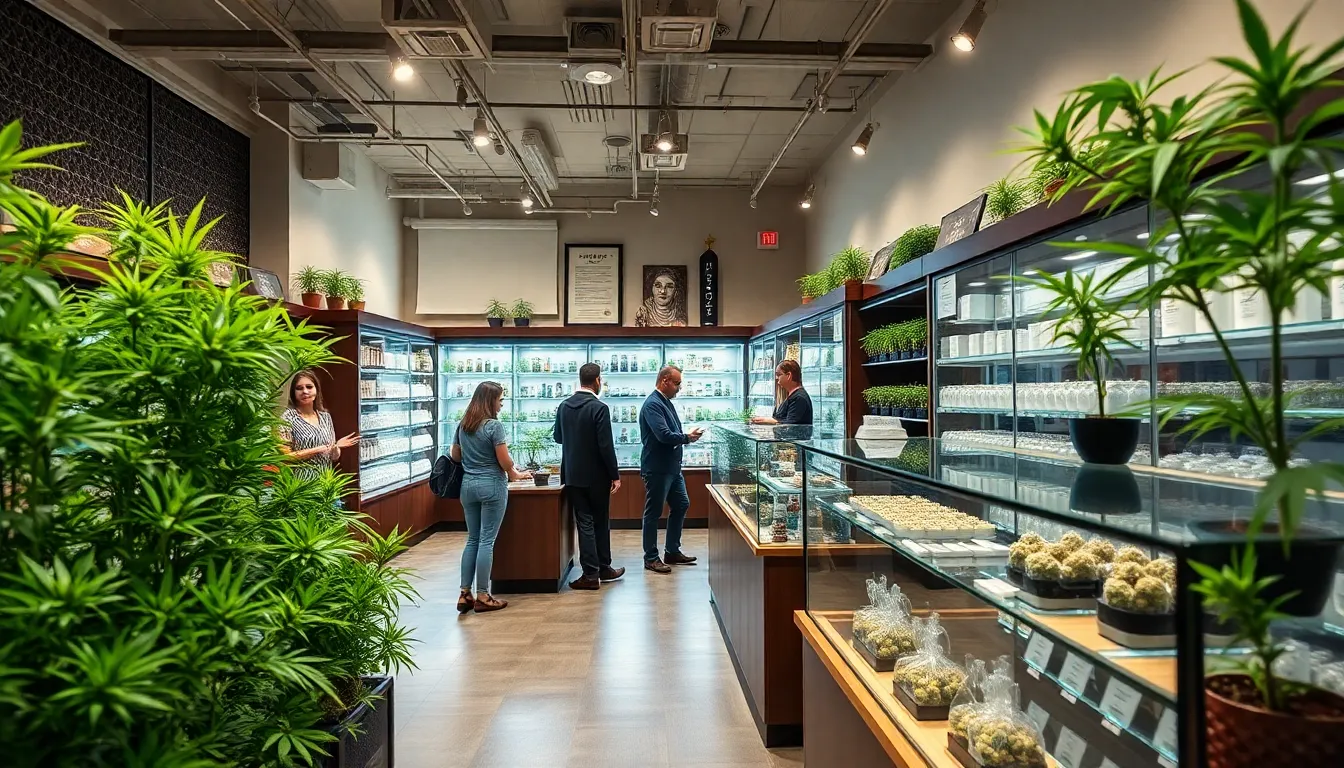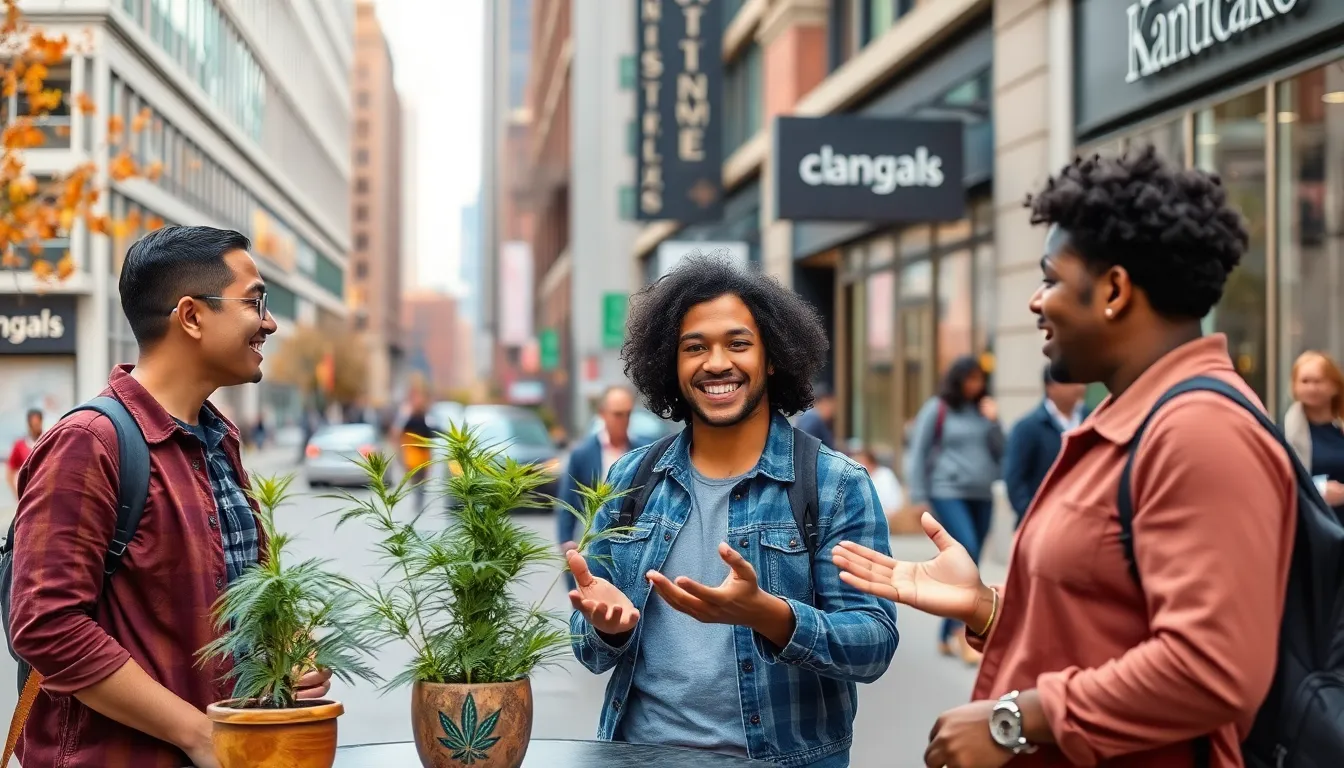As the conversation around cannabis legalization continues to evolve across the United States, many are left wondering about the status of marijuana in Kansas City. With neighboring states embracing legal weed, the question of whether Kansas City follows suit becomes increasingly relevant.
Navigating the legal landscape can be tricky, especially with varying laws at state and local levels. For residents and visitors alike, understanding the current regulations surrounding cannabis use, possession, and sales in Kansas City is essential. This article dives into the specifics of marijuana legality in the city, shedding light on what individuals need to know in this rapidly changing environment.
Table of Contents
ToggleOverview of Cannabis Legislation
Cannabis laws vary significantly between federal and state jurisdictions. Understanding these laws is essential for navigating the cannabis landscape in Kansas City.
Federal Laws Related to Cannabis
Under the Controlled Substances Act, cannabis remains classified as a Schedule I drug federally. This classification indicates that it has no accepted medical use and a high potential for abuse. Consequently, federal law prohibits the cultivation, distribution, and possession of cannabis. However, state laws increasingly diverge from federal regulations, leading to a complex legal environment for users and businesses.
State Laws in Missouri
Missouri legalized medical marijuana in 2018 via constitutional amendment. Patients with qualifying medical conditions can obtain medical marijuana cards. Legal possession limits allow individuals to hold up to 4 ounces of marijuana. Sale and distribution are regulated by the state, with licensed dispensaries serving patients in need. Recreational use remains illegal; however, discussions around potential legalization continue. Residents and visitors must adhere strictly to state laws to avoid legal penalties.
Current Status of Cannabis in Kansas City

Kansas City’s cannabis laws reflect broader statewide regulations, with specific provisions for medical use and ongoing discussions about recreational cannabis. Understanding these regulations is crucial for residents and visitors alike.
Medical Cannabis Legalization
In Missouri, the legal framework for medical cannabis began with the passage of Amendment 2 in 2018. This legislation allows patients with qualifying medical conditions to apply for a medical marijuana card. Cardholders can possess up to 4 ounces of medical cannabis and obtain products from licensed dispensaries. As of October 2023, Missouri has over 200 operating dispensaries, ensuring access for patients across the state. Licensed growers and manufacturers are also part of the regulated system, providing patients with a variety of options for their medical needs.
Recreational Cannabis Status
As of now, recreational cannabis remains illegal in Kansas City and throughout Missouri. Despite efforts by advocacy groups and ongoing public discourse around legalization, no formal proposals have been enacted at the state level. Recent surveys indicate growing public support for recreational cannabis; however, legislative action has yet to materialize. Residents should stay informed about potential changes in the legal framework, as the landscape is continually evolving.
Application Process for Medical Cannabis
Navigating the application process for medical cannabis in Kansas City involves specific requirements and steps. Patients must adhere to state regulations established by Missouri law to successfully obtain their medical marijuana cards.
Requirements for Patients
Patients seeking medical marijuana cards must meet certain criteria.
- Patients must be at least 18 years old or have a legal guardian apply on their behalf.
- Patients must have a qualifying medical condition, including chronic pain, epilepsy, cancer, or PTSD, confirmed by a licensed physician.
- Patients must provide proof of residency in Missouri.
- Patients must submit a photo for their identification card, typically a headshot.
- Patients must not have any felony drug convictions within the past five years.
How to Obtain a Medical Marijuana Card
Obtaining a medical marijuana card follows a straightforward process.
- Schedule an Appointment: Patients must first schedule an appointment with a licensed physician who can evaluate their medical condition.
- Complete Medical Evaluation: Physicians conduct a thorough examination and assess whether the patient meets the qualifications for medical cannabis use.
- Obtain Physician’s Recommendation: If approved, the physician provides a signed recommendation form, essential for the application.
- Submit Application: Patients submit their application to the Missouri Department of Health and Senior Services along with the required documentation and a non-refundable application fee.
- Wait for Approval: After submission, patients wait for the Department to process their application, which typically takes 30 days. Upon approval, patients receive their medical marijuana card, allowing them to purchase cannabis from licensed dispensaries.
Impacts of Cannabis Legalization in Kansas City
Cannabis legalization in Kansas City carries various economic, social, and health implications. Understanding these impacts is essential as the city navigates its current legal landscape.
Economic Benefits
Legalizing cannabis contributes to significant economic advantages. The establishment of dispensaries creates job opportunities in areas like retail, cultivation, and management. Missouri’s cannabis market generated over $300 million in sales in 2022, contributing more than $40 million in taxes to the state revenue. Local businesses that support the cannabis industry, such as security firms and packaging suppliers, also benefit. Increased tax revenue could provide funding for public services, including education and infrastructure. Furthermore, attracting cannabis tourism can enhance Kansas City’s economy by bringing in visitors interested in legal cannabis experiences.
Social and Health Implications
Cannabis legalization plays a role in addressing social and health issues. Legal access to cannabis allows individuals with qualifying medical conditions to manage symptoms more effectively, promoting overall health. Studies indicate that medical cannabis can reduce reliance on opioids, potentially decreasing overdose rates. Socially, legalization may reduce the stigma associated with cannabis use, fostering open discussions about its benefits and risks. However, challenges still exist, including ensuring responsible use and addressing concerns related to impaired driving. Public health campaigns can raise awareness, promoting safe practices in cannabis consumption.
Future of Cannabis Legalization in Kansas City
The future of cannabis legalization in Kansas City remains uncertain but is shaped by legislative discussions and evolving public perspectives. Key developments in potential changes to legislation and public opinion trends play crucial roles in this ongoing conversation.
Potential Changes in Legislation
Changes in cannabis legislation could emerge as legislators respond to evolving public sentiments and advocacy efforts. Proposals for adult-use cannabis legalization have surfaced in the Missouri General Assembly, with some representatives pushing for a regulatory framework similar to other states. Despite the absence of formal proposals as of October 2023, advocates continue to lobby for reform, emphasizing the benefits of tax revenue and job creation. Stakeholders monitor these developments closely, noting that grassroots campaigns can lead to significant political shifts within the local government.
Public Opinion Trends
Public opinion in Kansas City is gradually shifting in favor of cannabis legalization. Recent surveys indicate that a growing majority of residents support recreational use, citing benefits like personal freedom, economic opportunities, and health management. Advocacy groups leverage this momentum, organizing events and educational campaigns to increase awareness about the potential impacts of legalization. With increased visibility, community conversations can influence lawmakers and propel legislation forward, making it vital for policymakers to stay attuned to public needs and expectations.
Understanding the current cannabis landscape in Kansas City is crucial for residents and visitors alike. While medical marijuana is legal under specific regulations, recreational use remains prohibited. Ongoing discussions and advocacy efforts indicate a growing interest in potential legalization.
As public opinion shifts and legislative proposals emerge, the future of cannabis in Kansas City could change significantly. Staying informed about these developments will help individuals navigate the complexities of cannabis laws and ensure compliance with local regulations. The evolving nature of cannabis legislation highlights the importance of awareness in this dynamic environment.







